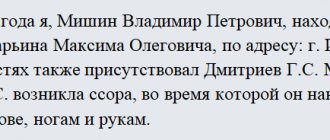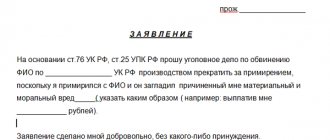Reasons for filing a complaint with the Investigative Committee
According to the provisions of Federal Law No. 59 “On Citizens’ Appeals,” every Russian has the right to seek protection from law enforcement and regulatory government agencies.
The reasons for filing a complaint with the Investigative Committee are the following situations:
- Violations of criminal procedural legislation committed by investigators of the Ministry of Internal Affairs or the prosecutor's office during the investigation of a crime.
- Errors and inconsistencies contained in the indictment entered by the judge.
- Violations of criminal law committed by civil servants of all levels and departments.
- Criminal acts on the part of the employer.
- Violations of official instructions, or inaction of bailiffs.
This is not a complete list of reasons why you can apply to the SKRF.
For the investigator
You can write a complaint to the Investigative Committee against an investigator if, in the course of performing his official duties, he grossly violates the provisions of the Code of Criminal Procedure.
You can also complain against him when he directly violates the provisions of criminal law :
- Commits official forgery;
- Tries to extort a bribe to dismiss the case, reclassify it to a lighter article of the Criminal Code, etc.;
- Negligently performs official duties;
- Allowed the disclosure of confidential data, which led to undesirable consequences for the participants in the case;
- Exceeds his authority;
- Enters into a conspiracy with representatives of the person under investigation, the victim or other interested parties;
- Allows other actions that qualify as a criminal act or official crime.
To the policeman
Employees of the Ministry of Internal Affairs are obliged, when performing their service, to be guided by the provisions of Federal Law No. 3 “On the Police,” internal departmental orders and the current legislation of the Russian Federation.
Yulia Kalinina
Consumer Protection Lawyer
Ask me a question
In case of violation of these legislative norms, the affected persons have the right to file a complaint with the investigative committee against the police officer.
There are two main reasons for filing an application with the ICRF for an employee of the Ministry of Internal Affairs:
- Unlawful actions that violate articles of the criminal code. For example, extortion, abuse of power, unlawful use of force, illegal detention.
- Negligent inaction leading to serious consequences. As an example, we can point out a situation where police officers refused to respond to an incoming call. As a result of this, the attackers freely committed a criminal offense.
For the employer
If an employer maliciously violates the provisions of labor legislation or the Criminal Code, affected employees have the right to file a complaint with the Investigative Committee of the Russian Federation.
Reasons for this include:
- Delay in payment of wages for more than 3 months, vacation pay, maternity and other payments;
- Moral or physical influence on an employee with the aim of forcing him to resign or, conversely, to suppress his attempts to resign, to commit official forgery;
- Other acts falling within the scope of the UKRF.
To the judge
An application for a judge to the Investigative Committee of the Russian Federation is submitted in several situations. If, during the trial, they committed gross violations of the Code of Criminal Procedure.
Eg
The judge, for various reasons, ignored important evidence of the defendant’s innocence or guilt. When reaching a court verdict, important facts were not taken into account, or the verdict was based on unverified evidence of dubious reliability.
The reasons for these violations can be either negligence or low qualifications, or a criminal conspiracy of corruption. The victim does not need to independently find out the reason for the mistake. To submit an appeal to the Investigative Committee, the fact that there has been a violation of the Code of Criminal Procedure on the part of the judge is sufficient.
According to Federal Law No. 3132-1 “On Judges”, they have legal immunity. But if a judge violates criminal law, this immunity is removed from him.
Organization of reception of citizens
In the central office of the Investigative Committee of the Russian Federation (hereinafter referred to as the Investigative Committee), the reception of citizens, representatives of state and public organizations and other persons is carried out by the heads of the main directorates, departments, departments and their deputies according to the schedule approved by the Chairman of the Investigative Committee of the Russian Federation (hereinafter referred to as the Chairman of the Investigative Committee ).
At a personal reception, a citizen must present a document proving his identity. If necessary, the head of another main board, department, department of the Investigative Committee or his deputy, whose competence includes consideration of the applicant’s appeal, may be involved in the reception of a citizen. Reception of citizens by the Chairman of the Investigative Committee is carried out on appeals that were resolved by his deputies and the head of the department of personal security, physical protection and official checks, and by the Deputy Chairman of the Investigative Committee - on appeals that were resolved by the heads of the main directorates, directorates, departments, heads of independent departments of the central apparatus of the Investigative Committee committee.
How to send a complaint to the Investigative Committee of the Russian Federation
There are several ways to file a complaint with the investigative committee:
- Upon personal appearance at the territorial office of the department.
- By mail.
- Call the hotline.
- Online on the official website.
Personally
You can submit an oral or written application to the Investigative Committee during a personal visit to the territorial office of the department.
You can find out the address of its location by calling the toll -free hotline 8 (800) 100-12-60 , or on the official website of the Investigative Committee.
In the organizational structure of the department there is a special unit responsible for receiving and considering submitted applications.
If the submitted appeal contains facts about particularly serious crimes, the applicant is sent directly to the duty investigator of the Investigative Committee.
The central reception office of the department is located at the address: Moscow, st. First Frunzenskaya, house No. 3-A .
Reception hours for citizens:
- Monday - Thursday: from 9-00 to 20-00;
- On Friday and on holidays: from 9-00 to 19-00. Lunch break from 13:00 to 14:00.
You can also submit a written application by placing a sealed envelope in the boxes for receiving applications installed at the entrances of the territorial branches of the SKRF.
By phone
To provide background information and receive citizens' requests, the Investigative Committee's hotline number is: 8.
The phone operates 24 hours a day and is free for subscribers of all operators from all regions of Russia. When calling, you should introduce yourself, clearly and clearly state the essence of the problem, and provide information about the offender.
Russian Post
You can send a written complaint to the Investigative Committee of the Russian Federation at the address of its territorial divisions, or to the central department.
The department for accepting written applications from the main office of the SKRF is located at the address: 105005, Moscow, Tekhnicheskiy lane, building No. 2 .
The envelope must have the sender's address and full name.
Anonymous appeals , if they do not relate to crimes of special importance (terrorism, extremism, treason), are not accepted .
Online
The most convenient option for submitting an appeal to the Investigative Committee is to use the official website of the Investigative Committee.
On the main page you can familiarize yourself with the rules for filing appeals, the list of articles within the competence of the investigative committee, and the procedure for considering incoming complaints.
Next, under the text you read, you need to agree to the terms of use of the IC Internet reception. After this, you are automatically redirected to a page with an electronic application form.
Here you need to enter the requested information in the empty fields :
- Applicant details;
- His occupation;
- Description of the essence of the complaint (no more than 500 characters).
You can attach digitized documents to the form that form the evidence base for the legitimacy of the complaint filed. The size of the attached file should not exceed 5 MB.
Straight line
8 Helpline “Child in Danger”
- Management
- Structure
- Story
- Official symbols
- Financial and economic
- Media contacts
- Sledkom TV
- Normative base
- Regulatory legal and other acts in the field of anti-corruption
- Internet reception
- Moscow Academy of the Investigative Committee
- Council of Heads of Investigative Agencies of the Investigative Committee of Russia
- Normative legal acts
- Regulatory documents for the appointment, extension, recalculation and payment of pensions to pensioners of the Investigative Committee of the Russian Federation
- International documents
8 Helpline “Child in Danger”
- Management
- Structure
- Story
- Official symbols
- Financial and economic
- Media contacts
- Sledkom TV
- Normative base
- Regulatory legal and other acts in the field of anti-corruption
- Internet reception
- Moscow Academy of the Investigative Committee
- Council of Heads of Investigative Agencies of the Investigative Committee of Russia
- Normative legal acts
- Regulatory documents for the appointment, extension, recalculation and payment of pensions to pensioners of the Investigative Committee of the Russian Federation
- International documents
voennpravo.ru
Write a letter to Bastrykin Investigative Committee electronic
How to submit an application to the investigative committee, sample
The application must be drawn up in accordance with certain rules adopted in domestic legal paperwork.
The structure of the submitted document consists of three parts:
- Introduction . This contains information about the complainant and the name of the institution to which the application is sent.
- Descriptive part . It must indicate the reason for the complaint and the details of the violator of the law.
- Resolution part . This sets out the requirement to take action against offenders.
The paper must be certified by the applicant’s personal signature, and the date of its preparation must also be indicated.
Management
Biography Alexander Ivanovich Bastrykin was born on August 27, 1953 in Pskov into a family of workers who participated in the Great Patriotic War.
Father, Ivan Ilyich, a naval officer, fought in the combat units of the Northern Fleet and was awarded military decorations. Mother, Evgenia Antonovna, is an anti-aircraft gunner, fought in the combat units of the Red Banner Baltic Fleet, and was awarded military awards.
Since 1958 A.I. Bastrykin and his family live in Leningrad. Education: In 1970 he graduated from secondary school No. 27 in the Vasileostrovsky district of Leningrad with in-depth study of the Russian language, history and literature. In 1975 he graduated from the Faculty of Law of Leningrad State University (LSU) named after.
A.A. Zhdanov, in 1980 - graduate school at Leningrad State University.
Doctor of Law (1987), topic of doctoral dissertation –
“Problems of interaction between the norms of domestic and international law in the field of Soviet criminal proceedings”
Algorithm for filing a complaint with the RF IC
The step-by-step algorithm for filing a complaint with the Investigative Committee during a personal visit looks like this:
- The first step is to collect all possible evidence of the correctness of your suspicions about the crime that has occurred. These are photos and video materials, witness statements, documentation.
- An application is drawn up in accordance with the requirements of Federal Law No. 59 “On Appeals...”.
- The application is written in two copies - one for transmission to the reception office of the Investigative Committee, the other as confirmation of the fact of the application.
- The entire package of documentation, consisting of the application and evidence, is submitted to the receptionist of the law enforcement agency. Both copies of the complaint must be signed and stamped by the responsible employee.
- The received appeal is registered in a special journal and is assigned a serial number. The submitter receives a receipt confirming the acceptance of his official application.
Break through to Bastrykin
In August last year, a resident of the Predgorny district of the Stavropol Territory, human rights activist Pavel Kulbyakov, managed to get an appointment with Bastrykin in Moscow. He told the head of the Investigative Committee of Russia about the blatant facts of the existence of an organized criminal community in the Stavropol region with the participation of government officials.
He named the names of people closely united by common business interests, criminal and family ties.
And what? Kulbyakov, an economist by training, was an entrepreneur in the recent past.
In 2008, a crime was committed against him, which was later classified under the article “Extortion.” In fact, people were deprived of their business and livelihood. The criminal case was opened only in November 2010, Kulbyakov was recognized as a victim. But the final decision on this criminal case has not yet been made.
All these years, Pavel Nikolaevich has been seeking a legal solution to the case, writing statements and complaints to various law enforcement agencies.
Blog Rules
RULES of the “Blog” of the Chairman of the Investigative Committee of the Russian Federation In order to leave a comment in the “Blog” of the Chairman of the Investigative Committee of the Russian Federation, you must fill out the fields of the email form on the “Add a comment” web page, marked *.
These fields are required. Information sent by a site visitor by filling out the fields of an electronic message form is stored and processed in compliance with the requirements of the legislation of the Russian Federation on personal data.









